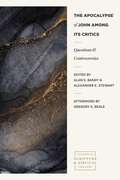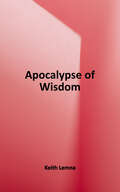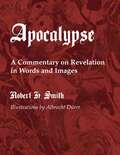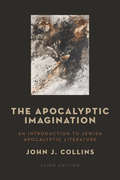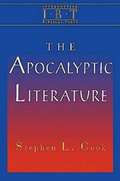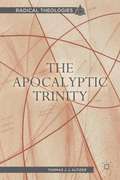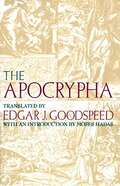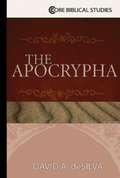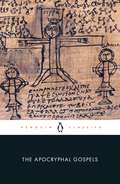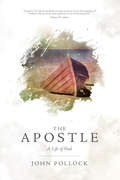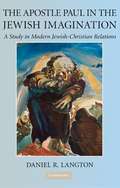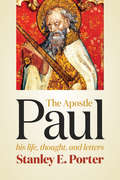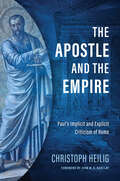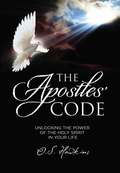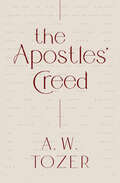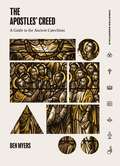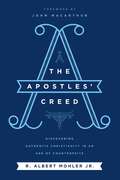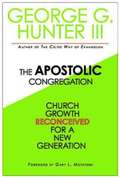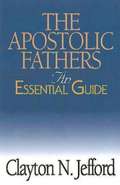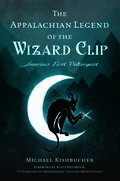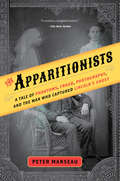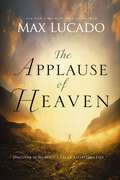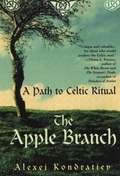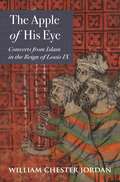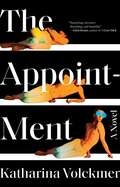- Table View
- List View
The Apocalypse of John Among its Critics: Questions and Controversies (Studies in Scripture and Biblical Theology)
by Alan S. Bandy Alexander E. StewartShould Christians be embarrassed by the book of Revelation? The Revelation of John has long confused and disturbed readers. The Apocalypse of John among Its Critics confronts the book's difficulties. Leading experts in Revelation wrestle honestly with a question raised by critics: Should John's Apocalypse be in the canon? (Alan S. Bandy) Was John intentionally confusing? (Ian Paul) Was John a bully? (Alexander E. Stewart) Did John delight in violence? (Dana M. Harris) Was John a chauvinist? (Külli Tõniste) Was John intolerant to others? (Michael Naylor) Was John antisemitic? (Rob Dalrymple) Did John make things up about the future? (Dave Mathewson) Did John advocate political subversion? (Mark Wilson) Did John misuse the Old Testament? (G.K. Beale) Engaging deeply with Revelation's difficulties helps the reader understand the book's message—and respond rightly. The book of Revelation does not need to be avoided or suppressed. It contains words of life.
The Apocalypse of Wisdom: Louis Bouyer's Theological Recovery of the Cosmos
by Keith LemnaIn the present book, author Keith Lemna contributes to a growing body of scholarship and a comprehensive study of Louis Bouyer's cosmological vision. Lemna deeply explores Bouyer's sophiological and apocalyptic theology of creation, detailing his engagement with scientific, philosophical, religious-mythic, and poetic cosmologies.
The Apocalypse: A Commentary On Revelation In Words And Images
by Albrecht Dürer Robert H. SmithThe year 1998 marked the quincentennial of the publication of Albrecht Dürer's illustrated edition of the Apocalypse. Here Robert Smith provides an introduction to and a commentary on the book of Revelation that is keyed to the Dürer woodcuts.
The Apocalyptic Imagination: An Introduction to Jewish Apocalyptic Literature
by John J. CollinsOne of the most widely praised studies of Jewish apocalyptic literature ever written, The Apocalyptic Imagination by John J. Collins has served for over thirty years as a helpful, relevant, comprehensive survey of the apocalyptic literary genre. After an initial overview of things apocalyptic, Collins proceeds to deal with individual apocalyptic texts — the early Enoch literature, the book of Daniel, the Dead Sea Scrolls, and others — concluding with an examination of apocalypticism in early Christianity. Collins has updated this third edition throughout to account for the recent profusion of studies germane to ancient Jewish apocalypticism, and he has also substantially revised and updated the bibliography.
The Apocalyptic Literature: Interpreting Biblical Texts Series (Interpreting Biblical Texts)
by Stephen L. CookBiblical texts create worlds of meaning and invite readers to enter them. When readers enter such textual worlds, which are strange and complex, they are confronted with theological claims. With this in mind, the purpose of the IBT series is to help serious readers in their experience of reading and interpreting by providing guides for their journeys into textual worlds. The focus of the series is not so much on the world behind the text as on the worlds created by the texts in their engagement with readers. Nowhere is the world of the biblical text stranger than in the apocalyptic literature of both the Old and New Testaments. In this volume, Stephen Cook makes the puzzling visions and symbols of the biblical apocalyptic literature intelligible to modern readers. He begins with definitions of apocalypticism and apocalyptic literature and introduces the various scholarly approaches to and issues for our understanding of the text. Cook introduces the reader to the social and historical worlds of the apocalyptic groups that gave rise to such literature and leads the reader into a better appreciation and understanding of the theological import of biblical apocalyptic literature. In the second major section of the book, Cook guides the reader through specific examples of the Bible’s apocalyptic literature. He addresses both the best-known examples (the biblical books of Daniel and Revelation) and other important but lesser known examples (Zechariah and some words of Jesus and Paul).
The Apocalyptic Trinity
by Thomas J. J. AltizerThis book is a major step forward in radical theology via a sustained and creative challenge to conventional and orthodox thinking on the Trinity. Altizer presents a radical rethinking of the apocalyptic trinity and recovers the apocalyptic Jesus of Hegel, Blake, and Nietzsche.
The Apocrypha
by Edgar J. GoodspeedThe powerful collection of books from the Greek version of the Jewish Bible—the earliest complete version of the Bible we possess—but that were not included in the final, canonical version of the Hebrew Bible. <p><p> They were called “Apocrypha,” the hidden or secret books, and while they formed part of the original King James version of 1611, they are no longer included in modern Bibles. Yet they include such important works as The First Book of Maccabees, the Wisdom of Solomon, Ecclesiasticus, and the stories of Susanna, Tobit, and Judith, and other works of great importance for the history of the Jews in the period between the rebuilding of the Temple and the time of Jesus, and thus for the background of the New Testament. These works have also had a remarkable impact on writers and artists. Beyond this, they are often as powerful as anything in the canonical Bible. <p><p> The translation into contemporary English is by Edgar J. Goodspeed.
The Apocrypha: Message, Context, And Significance
by David A. deSilvaFor many across the world, the books of the Apocrypha are Christian Scripture. Learn more about them as you learn more about how Jesus thought and lived. Using a thematic approach, Dr. David deSilva gives a brief introduction and summary of these largely unknown and unappreciated books. In addition the book gives an overview to the social and cultural context of the world of the Apocrypha and early Christianity. After surveying the Apocrypha’s relevance and impact on Christian practices and spiritual formation, the book highlights the Apocrypha’s impact on Jesus, the New Testament, and the formation of the Early Church’s doctrines and theology. Core Biblical Studies fulfill the need for brief, substantive, yet highly accessible introductions to key subjects and themes in biblical studies. In the shifting tides of biblical interpretation, these books are designed to help students locate relevant meanings in conversation with the text. As a first step toward substantive and subsequent learning, the series draws on the best scholarship in order to provide foundational concepts and contextualized information on a broad scope of issues, methods, perspectives, and trends.
The Apocryphal Gospels
by Simon GathercoleA new translation of the oldest non-canonical Christian gospels In the early years of Christianity, several groups produced 'hidden' or 'apocryphal' gospels, alternative versions of the story of Christ. Sometimes these texts complemented the four canonical gospels of the New Testament, sometimes they subverted them and often they were completely different. Here, in the widest selection of non-canonical gospels gathered in one volume - which also includes two modern forgeries - we see the young Jesus making live birds from clay, hear his secret words of wisdom, discover gnostic cosmologies and witness the Harrowing of Hell. Preserved by their readers and attacked by their detractors, these gospels shine a fascinating light on the early Christian Church.Translated with an Introduction by Simon Gathercole
The Apostle
by John PollockThe Acclaimed, Authentic Biography of the Early Church's Greatest Evangelist--the Apostle Paul.Master storyteller John Pollock makes Paul and his amazing story freshly alive, so that you can know the greatest apostle much as Luke and Timothy did as they traveled with him. As you turn the pages, you'll sense Paul's motives, his aims and priorities; what mattered to him; and what he was willing to die for.
The Apostle Paul in the Jewish Imagination: A Study in Modern Jewish-Christian Relations
by Daniel R. LangtonThe Apostle Paul in the Jewish Imagination is a pioneering multidisciplinary examination of Jewish perspectives on Paul of Tarsus. Here, the views of individual Jewish theologians, religious leaders, and biblical scholars of the last 150 years, together with artistic, literary, philosophical, and psychoanalytical approaches, are set alongside popular cultural attitudes. Few Jews, historically speaking, have engaged with the first-century Apostle to the Gentiles. The modern period has witnessed a burgeoning interest in this topic, however, with treatments reflecting profound concerns about the nature of Jewish authenticity and the developing intercourse between Jews and Christians. In exploring these issues, Jewish commentators have presented Paul in a number of apparently contradictory ways. The Apostle Paul in the Jewish Imagination represents an important contribution to Jewish cultural studies and to the study of Jewish-Christian relations.
The Apostle Paul: His Life, Thought, and Letters
by Stanley E. PorterIn this comprehensive introduction to the apostle Paul, Stanley Porter devotes serious consideration both to the background and major contours of Paul’s thought and to the unique contributions of each of his letters. Porter begins by introducing the Pauline tradition and outlining the basics of Paul’s life, the chronology of his ministry, and his several imprisonments. Porter then discusses the background to Paul’s thought, examines some of the major themes of his writings, and treats issues concerning the Pauline epistles, such as pseudonymity and canon. Finally, Porter delves into all thirteen of Paul’s letters individually, placing them within their historical contexts and examining critical issues relating to the content and interpretation of each letter. The result is a thorough, balanced treatment of one of the most important figures in Christianity.
The Apostle and the Empire: Paul's Implicit and Explicit Criticism of Rome
by Christoph HeiligWas Paul silent on the injustices of the Roman Empire? Or have his letters just been misread?The inclusion of anti-imperial rhetoric in Paul&’s writings has come under scrutiny in recent years. Pressing questions about just how much Paul critiques Rome in his letters and how publicly critical he could have afforded to be have led to high-profile debates—most notably between N. T. Wright and John M. G. Barclay.Having entered the conversation in 2015 with his book Hidden Criticism?, Christoph Heilig contributes further insight and new research in The Apostle and the Empire, reevaluating the case for Paul hiding his criticism of Rome in the subtext of his letters. Heilig argues that scholars have previously overlooked passages that openly denounce the empire—for instance, the &“triumphal procession&” in 2 Corinthians, which Heilig discusses in detail by drawing on a variety of archaeological data.Furthermore, Heilig takes on larger issues of theory and methodology in biblical studies, raising significant questions about how interpreters can move beyond outdated methods of reading the New Testament toward more robust understandings of the ways ancient texts convey meaning. His groundbreaking work is a must-read for Pauline scholars and for anyone interested in how one of Christianity&’s most important teachers communicated his unease with the global superpower of his day.
The Apostles' Code: Unlocking the Power of God’s Spirit in Your Life (A 40-Day Devotional) (The Code Series)
by O. S. HawkinsDo you have moments when you feel defeated, scared, or hopeless? Are you looking for a way to understand the work of the Holy Spirit and create a deeper relationship with Christ? Discover the power of the Holy Spirit in your life as bestselling author O. S. Hawkins leads readers on a 40-day journey from Easter to Pentecost in The Apostles&’ Code.In this affordable paperback resource, readers will:Embark on a 40-day journey, guided by O. S. Hawkins, to discover the power of the Holy Spirit in their livesEngage with a daily reflection accompanied by a Code word for the day, an encouraging Scripture, and a prayer The digital booklet is perfect for:Church distribution to members during Ascension, Bible study groups, and worship groupsIn-person and virtual discussions of the Holy Spirit and Ascension The apostles must have felt defeated when Jesus was crucified because they abandoned Jesus and fled. Yet just a few weeks later they couldn't help but boldly speak of the things they had seen and heard. What empowered them to be willing to lay down their lives for Jesus? It was the Holy Spirit who came to live in each of them at Pentecost. And He is the same Holy Spirit who lives in each of us who trust Him for our salvation.Feel the power of the Holy Spirit in your life today, and be filled with the promise that He will never leave you or forsake you.
The Apostles' Creed
by A. W. TozerWe believe . . . an ancient creed is essential for today. A. W. Tozer derived great personal satisfaction and help from the church creeds, and he used them as he preached and taught. This new book draws on four previously published essays and several articles that have never before been published in books. Tozer brings the reader through the essential facets of the Christian faith through the Apostles' Creed:God the Father, Jesus Christ, and the Holy SpiritWhat it means that Jesus was Crucified, Resurrected, Ascended, and ReturningHow are we to understand The Communion of the Church, Forgiveness, and EternityBeginning with Why the Creeds are Still Important Today and ending with Connecting Our Creeds to Our Deeds, this book brings the reader into a rich experience of the Christian life. If you wish to study the classic truths of biblical doctrine and connect them to a vibrant spiritual life, join Tozer in a journey through The Apostles' Creed.
The Apostles' Creed: A Guide to the Ancient Catechism (Christian Essentials)
by Benjamin MyersDo you believe? Today, we're flooded with opinions and ideas. And they all might be interesting, but are they true? Would you die for them? Benjamin Myers re-introduces the Apostles' Creed, helping us to see how difficult and counter-cultural the Creed really is. It doesn't give us sweet, empty words. It's a faith that demands we die so that we might live. In the early church, many converts died for their faith so they needed to have a good idea what they might die for. Early church pastors and theologians used the Apostles' Creed as the essential guide to the basics of the Christian life. The Apostles' Creed has united Christians from different times, different places, and different traditions. The truths proclaimed in the Creed are eternal. Will you trust them?
The Apostles' Creed: Discovering Authentic Christianity in an Age of Counterfeits
by Jr. R. Albert MohlerThe president of Southern Baptist Theological Seminary reveals how understanding and living out of the oldest summary of Christian belief leads to a confident, bold, joy-filled existence in a world of confusion and uncertainty.The Apostles' Creed has shaped and guided Christian faith for almost two thousand years. Few documents in the history of the church have similar influence on the life of ordinary believers. Shared by Protestant, Roman Catholic, and Eastern Orthodox traditions, the Apostles' Creed is perhaps the most compelling and formidable statement of Christian doctrine the world has ever known. But do we know what it really means--and how it applies to us today?In The Apostles' Creed, renowned theologian and pastor R. Albert Mohler Jr. works line-by-line and phrase-by-phrase through each section of the Creed, explaining in clear terms what it means and how it equips Christians to live faithfully in a post-Christian culture. From understanding the nature of the Trinity and the miracle of the Incarnation to the world-shaking truth of the resurrection and the hope of Christ's return, the theological heritage contained in this ancient statement has the power to shape us for vibrant and steadfast living today. The Apostles' Creed shows us how.
The Apostolic Congregation: Church Growth Reconceived for a New Generation
by George G. Hunter IIIA church in the heart of Manhattan and a congregation among the Inuit people of Northern Canada would seem to have little in common with one another. Yet in one way they are surprisingly similar: They are both apostolic congregations, churches whose every program exists for the purpose of presenting the gospel to non-Christians, and making disciples of Jesus Christ.What is the secret of churches like these; how have they learned to make evangelism central to everything they do? In studying apostolic congregations around the world, George G. Hunter III has discovered a set of perspectives and practices that they all share. With the passion and insight for which he is so well known, Hunter demonstrates how your congregation can learn to focus on the one thing that most matters: bringing people into a saving relationship with Jesus Christ.
The Apostolic Fathers: An Essential Guide (Essential Guides Ser.)
by Clayton N. JeffordThe Apostolic Fathers is a collection of early Christian writings from the late first and early second centuries, traditionally considered to have been written by those connected with the Apostles, and therefore reflecting authentic Apostolic teaching. These writings include 1 Clement, 2 Clement, Ignatius, Polycarp, Didache, Barnabas, Papias, Hermas, Martyrdom of Polycarp, Diognetus, and Quadratus. Considering their historical context, the Apostolic Fathers bear directly on the study of the New Testament, the development of the early Church, and the history of Christian theology.The Apostolic Fathers: An Essential Guide will explain the nature of the collected writings as they stand between the world of the New Testament and later Christian writers, focusing upon what the texts say about ancient Christian thinkers, early church developments, and the evolution of theological ideas prior to the great ecumenical councils.Chapter Outline:*Chapter 1: The Collected Writings*Chapter 2: People and Places*Chapter 3: Connections to Scripture*Chapter 4: Theological Ideas*Chapter 5: Structures of the Ancient Church *Chapter 6: Roots of the Patristic TraditionHere is a long awaited volume that treats in a concise and readable format a body of literature too often neglected, but absolutely essential to our understanding of Christian origins. Clayton Jefford brings unrivaled expertise to this task and serves as a sensitive and insightful guide to these texts, offering an introduction that will serve the needs of the beginning student and the seasoned expert alike. It is sure to be at the top of the reading list for anyone interested in this important topic. Stephen J. PattersonEden Theological SeminarySt. Louis"The author’s goal—a simple and sensible first introduction to the ideas and beliefs of the Apostolic Fathers—is fully realized as he organizes his survey of these intriguing ancient Christian writers according to topics—including scripture, theology, and church structure—of continuing contemporary interest. A reliable guide for students and study groups."Michael HolmesBethel UniversitySt. Paul, MinnesotaClayton N. Jefford is Professor of Scripture at Saint Meinrad School of Theolgy and is the Secretary-Treasurer of the North American Patristics Society. He has written and edited six volumes and is best known for his research in the fields of the Didache and the Apostolic Fathers.
The Appalachian Legend of the Wizard Clip: America's First Poltergeist (The History Press)
by Michael KishbucherIn the early 1790s, a Lutheran family in Appalachia fell victim to a menacing spirit that Lutheran, Methodist and Episcopal clergy as well as Folk magic practitioners failed to remove. The entity, which came to be known as the Wizard Clip, was said to cut or slice anything made of cloth or leather. Was it a ghost or a demon? After years of torment, the deeply Protestant family finally found respite from a seemingly impossible ally, a Catholic exorcist. This legend has eerie parallels to lore of ghosts and witches from the Old World as well as the early American Republic. As American religious leaders sought to find a place for their congregations in a post-Revolutionary time of enlightened secularism, tales like these helped churches define themselves, and this particular story was used to distinguish Catholic supernaturalism from later spiritualism. Author Michael Kishbucher tells a spooky and incredibly compelling story that shines a light on the region's religious history.
The Apparitionists: A Tale of Phantoms, Fraud, Photography, and the Man Who Captured Lincoln's Ghost
by Peter ManseauA story of faith and fraud in post–Civil War America, told through the lens of a photographer who claimed he could capture images of the dead. In the early days of photography, in the death-strewn wake of the Civil War, one man seized America&’s imagination. A &“spirit photographer,&” William Mumler took portrait photographs that featured the ghostly presence of a lost loved one alongside the living subject. Mumler was a sensation: The affluent and influential came calling, including Mary Todd Lincoln, who arrived at his studio in disguise amidst rumors of séances in the White House. Peter Manseau brilliantly captures a nation wracked with grief and hungry for proof of the existence of ghosts and for contact with their dead husbands and sons. It took a circus-like trial of Mumler on fraud charges, starring P. T. Barnum for the prosecution, to expose a fault line of doubt and manipulation. And even then, the judge sided with the defense, suggesting no one would ever solve the mystery of his spirit photography. This forgotten puzzle offers a vivid snapshot of America at a crossroads in its history, a nation in thrall to new technology while clinging desperately to belief. An NPR Best Book of 2017 &“A rare work of historical nonfiction that is both studious and just plain entertaining.&”—Publishers Weekly, Top Ten Books of 2017 &“An exceptional story.&”—Errol Morris, New York Times Book Review&“Manseau has become the foremost chronicler of the deep American desire to believe in the weird, the strange, and the oddly wonderful.&”—Jeff Sharlet, New York Times–bestselling author of The Family: The Secret Fundamentalism at the Heart of American Power
The Applause of Heaven: Discover the Secret to a Truly Satisfying Life (The\bestseller Collection)
by Max LucadoIt comes from God and it is within your reach ... The applause of heaven.<P><P> A joy that can't be quenched? A peace that can't be broken? A happiness that can't be threatened?<P> There is such a joy. It is a sacred delight, a holy gladness. You can't open your Bible without reading about it. You can't live a truly satisfying life without it. And it's nearer than you think.<P> Jesus describes that sacred delight in the astonishing mountain message we now call the Beatitudes. And Max Lucado, in this classic exploration of enduring joy, shows you how this familiar but revolutionary prescription for living can bless your life beyond your wildest imagining.<P> Imagine God doing what gods would do only in your wildest dreams -- wearing diapers, riding donkeys, washing feet, dozing in storms -- dying for you mistakes. Imagine having God as your pinch-hitter, you lawyer, your dad, you biggest fan, and you best friend. Imagine having the King of kings in your cheering section and hearing the applause of heaven ring out ... just for you.<P> But don't just imagine it. Open your heart to it -- the heavenly joy of knowing the God who delights in you.
The Apple Branch: A Path to Celtic Ritual
by Alexei KondratievAlexei Kondratiev combines the history, folklore, and language of the Celtic world in a unique guide for understanding its spirituality. He explores the myths, legends, and cultural figures, from Brigit to King Arthur, and he explains how the ancient Celtic religion survives in the context of modern Christianity.
The Apple of His Eye: Converts from Islam in the Reign of Louis IX (Jews, Christians, And Muslims From The Ancient To The Modern World Ser. #4)
by William Chester JordanThe thirteenth century brought new urgency to Catholic efforts to convert non-Christians, and no Catholic ruler was more dedicated to this undertaking than King Louis IX of France. His military expeditions against Islam are well documented, but there was also a peaceful side to his encounter with the Muslim world, one that has received little attention until now. This splendid book shines new light on the king’s program to induce Muslims—the “apple of his eye”—to voluntarily convert to Christianity and resettle in France. It recovers a forgotten but important episode in the history of the Crusades while providing a rare window into the fraught experiences of the converts themselves.William Chester Jordan transforms our understanding of medieval Christian-Muslim relations by telling the stories of the Muslims who came to France to live as Christians. Under what circumstances did they willingly convert? How successfully did they assimilate into French society? What forms of resistance did they employ? In examining questions like these, Jordan weaves a richly detailed portrait of a dazzling yet violent age whose lessons still resonate today.Until now, scholars have dismissed historical accounts of the king’s peaceful conversion of Muslims as hagiographical and therefore untrustworthy. Jordan takes these narratives seriously—and uncovers archival evidence to back them up. He brings his findings marvelously to life in this succinct and compelling book, setting them in the context of the Seventh Crusade and the universalizing Catholic impulse to convert the world.
The Appointment: A Novel
by Katharina VolckmerFor readers of Ottessa Moshfegh and Han Kang, a whip-smart, darkly funny, and subversive debut novel in which a woman on the verge of major change addresses her doctor in a stream of consciousness narrative.In a well-appointed examination in London, a young woman unburdens herself to a certain Dr. Seligman. Though she can barely see above his head, she holds forth about her life and desires, her struggles with her sexuality and identity. Born and raised in Germany, she has been living in London for several years, determined to break free from her family origins and her haunted homeland. But the recent death of her grandfather, and an unexpected inheritance, make it clear that you cannot easily outrun your own shame, whether it be physical, familial, historical, national, or all of the above. Or can you? With Dr. Seligman&’s help, our narrator will find out. In a monologue that is both deliciously dark and subversively funny, she takes us on a wide-ranging journey from Hitler-centered sexual fantasies and overbearing mothers to the medicinal properties of squirrel tails and the notion that anatomical changes can serve as historical reparation. The Appointment is an audacious debut novel by an explosive new international literary voice, challenging all of our notions of what is fluid and what is fixed, and the myriad ways we seek to make peace with others and ourselves in the 21st century.
